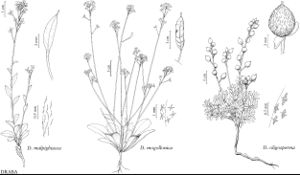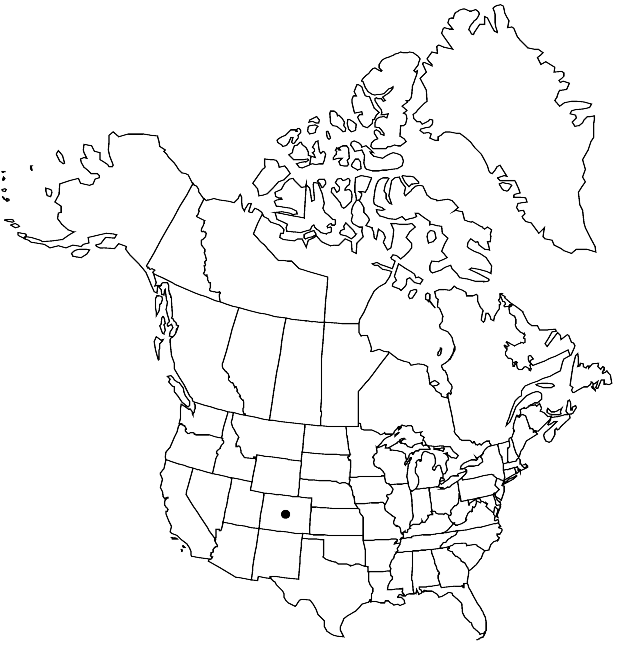Draba malpighiacea
Harvard Pap. Bot. 12: 417. 2007.
Perennials; caudex simple or branched (sometimes with persistent leaf bases); not scapose. Stems unbranched, 0.5–1.5 dm, pubescent throughout, trichomes malpighiaceous, 0.2–0.5 mm, and sometimes simple. Basal leaves rosulate; petiolate; petiole not ciliate; blade oblanceolate to spatulate, 0.5–1.8 cm × 2–4 mm, margins entire or dentate, (not ciliate proximally), surfaces pubescent with malpighiaceous trichomes, 0.3–0.6 mm. Cauline leaves 4–13; sessile; blade broadly ovate to lanceolate, margins denticulate, surfaces pubescent as basal. Racemes 10–33-flowered, ebracteate, elongated in fruit; rachis not flexuous, glabrous or pubescent, trichomes simple and/or malpighiaceous. Fruiting pedicels divaricate-ascending, straight or curved upward, 6–13 mm, pubescent abaxially, trichomes simple and/or malpighiaceous. Flowers: sepals ovate, 2.5–3 mm, subapically pubescent, (trichomes simple and malpighiaceous); petals yellow, oblanceolate, 4–5 × 1.5–2 mm; anthers oblong, 0.7–1 mm. Fruits elliptic to elliptic-lanceolate, plane, flattened, 5–10 × 1.5–2.2 mm; valves glabrous; ovules 14–18 per ovary; style 0.8–1.2 mm. Seeds ovoid, 1–1.4 × 0.7–0.9 mm.
Phenology: Flowering Jun–Aug.
Habitat: Rock outcrops and rocky slopes in subalpine conifer forests
Elevation: 3000-3500 m
Discussion
Draba malpighiacea, which is restricted to higher elevations in Hinsdale, La Plata, and Montezuma counties, has been included within D. spectabilis by previous authors. Preliminary data suggest that it is one of the diploid parents of tetraploid D. spectabilis. It is readily distinguished from all species of Draba in Canada and the United States by having a leaf indumentum of exclusively malpighiaceous trichomes. The only other species in the flora area with such trichomes is D. sibirica, a stoloniferous, scapose perennial known only from Greenland.
Selected References
None.

